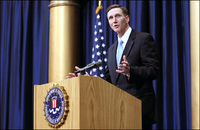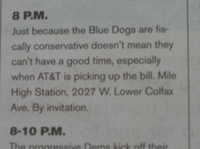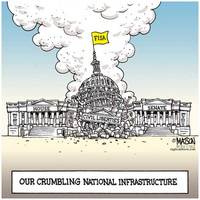Just as General Motors has in effect subsidized Big Oil by continuing to build gas-guzzlers in recent years, so has the USPS continued to subsidize Big Mail by shaping its operations to encourage what it now calls, revealingly, “standard mail”—that is, advertising junk mail. Most American citizens are blissfully unaware of the degree to which USPS subsidizes U.S. businesses by means of the fees it collects from ordinary postal customers. For example, if you wish to mail someone a large envelope weighing three ounces, you’ll pay $1.17 in postage. A business can bulk-mail a three-ounce catalog of the same size for as little as $0.14.And the USPS’s own “standard mail” is about to pop. It’s worse than you probably think. An article well worth reading.USPS management claims that “standard” mail makes lots of money, that the USPS makes a better margin delivering a “standard” mail package for $0.14 than it does a first-class one for $1.17. Why? Supposedly because of efficiencies produced by bulk-mail, machinable, zip-plus-four and zip-plus-nine standardization schemes. If you look at the revenue stream from advertising mail, it does look impressive, and it has been growing (for perverse reasons we’ll come to in a minute). But when you juxtapose next to that revenue stream the enormous transactional costs of maintaining a riotously complex rate structure to service it, you quickly reach a different conclusion: Standard mail, the costs of which are also generally tax-deductible for businesses, does not make money. It amounts to a corporate subsidy, which helps to explain why Congress, insofar as its members understand this, typically doesn’t object to the status quo. After all, these corporations have been known to contribute to electoral campaigns.
Actually, it’s worse than that. Not only are pennies shaved off the postage affixed to grandma’s letters routed directly into the pockets of direct-mail marketers, some 20 percent of direct-mail advertising volume is comprised of credit card, mortgage and other financial offers. So yes, the USPS has contributed in a subtle yet very real way to our burst economic bubble.
Category Archives: Corruption
Lessig’s Herculean Holiday Present: Reboot the FCC
 Here’s a good test for the new U.S. Executive: to recognize that
steady pragmatism means radical change, starting with the FCC:
Here’s a good test for the new U.S. Executive: to recognize that
steady pragmatism means radical change, starting with the FCC:
The solution here is not tinkering. You can’t fix DNA. You have to bury it. President Obama should get Congress to shut down the FCC and similar vestigial regulators, which put stability and special interests above the public good. In their place, Congress should create something we could call the Innovation Environment Protection Agency (iEPA), charged with a simple founding mission: “minimal intervention to maximize innovation.” The iEPA’s core purpose would be to protect innovation from its two historical enemies—excessive government favors, and excessive private monopoly power.Lessig gets the connection with his old topic of intellectual property and copyright. Those are monopolies granted by the federal government, and they have been abused by the monopoly holders just like the holders of communication monopolies: Continue reading—Reboot the FCC, We’ll stifle the Skypes and YouTubes of the future if we don’t demolish the regulators that oversee our digital pipelines. By Lawrence Lessig, Newsweek Web Exclusive, 23 Dec 2008
Treasury discloses “secret” documents to spyee defense lawyer
 That’s the problem with secrets.
You tell somebody, even somebody who works for you,
and eventually they tell someone else:
That’s the problem with secrets.
You tell somebody, even somebody who works for you,
and eventually they tell someone else:
As I recounted in Salon in July, lawyers for the Bush administration have gone to extreme and even bizarre lengths in their attempts to prevent the federal courts from determining the legality of the president’s warrantless electronic surveillance program. A key problem for them is a top-secret document that the Treasury Department accidentally disclosed to Al-Haramain’s lawyers in 2004. The document confirmed the surveillance of our clients, and thus, we contend, their legal standing to sue as victims of the program.Given thousands (or millions?) of people spied upon, eventually somebody is going to gain a foothold of legal standing to sue.—More evidence of Bush’s spying, Why the White House can no longer hide the truth about its warrantless surveillance of Americans. By Jon B. Eisenberg Salon.com, 12 September 2008
Oh, my, it gets better:
But since the July 2 ruling, we have discovered additional evidence of surveillance of our clients. In fall 2007, FBI deputy director John Pistole gave a speech at a conference of bankers and lawyers in which Pistole thanked the bankers for their cooperation in giving the FBI financial records for terrorist financing investigations, and then went on to describe the FBI’s 2004 investigation of Al-Haramain. In the text of the speech — which is posted on the FBI’s Web site — Pistole explicitly admitted that the FBI had used “surveillance” among other “investigative tools” in the Al-Haramain investigation, noting that “it was the financial evidence that provided justification for the initial [terrorist] designation” in February 2004.I’ve got to wonder whether the FBI director didn’t know that he was providing standing, or whether he did it deliberately because he’s tired of this legal charade and wants warrantless wiretapping to stop before the eventual lawsuits tar his agency even more than it already is.
If Al-Haramain wins, perhaps the next step would be to sue the government officials who authorized those illegal wiretaps.
-jsq
Selling Out Has Its Party: AT&T Fetes Blue Dogs
 Glenn Greenwald has video of attendees refusing to say who they were
or why they were there or what the party was for:
Glenn Greenwald has video of attendees refusing to say who they were
or why they were there or what the party was for:
Amazingly, not a single one of the 25-30 people we tried to interview would speak to us about who they were, how they got invited, what the party’s purpose was, why they were attending, etc. One attendee said he was with an “energy company,” and the other confessed she was affiliated with a “trade association,” but that was the full extent of their willingness to describe themselves or this event. It was as though they knew they’re part of a filthy and deeply corrupt process and were ashamed of — or at least eager to conceal — their involvement in it. After just a few minutes, the private security teams demanded that we leave, and when we refused and continued to stand in front trying to interview the reticent attendees, the Denver Police forced us to move further and further away until finally we were unable to approach any more of the arriving guests.The video includes Denver police repeatedly asking accredited press to move away from a public sidewalk.— AT&T thanks the Blue Dog Democrats with a lavish party, Glenn Greenwald, Salon, Monday Aug. 25, 2008 11:15 EDT (updated below (with video added) – Update II) Thursday, Aug 28, 2008
At another party,
an ABC News reporter was arrested while “attempting to take pictures on a public sidewalk of Democratic senators and VIP donors leaving a private meeting at the Brown Palace Hotel.”
Parties like this are part of the lobbying revolving door that
makes the U.S. look like a banana republic.
I’m picking on Democrats, here, but at least 75% of Senate Democrats
(including Hillary Clinton and Joe Biden, but not Barack Obama)
voted against the recent bad FISA bill.
A much higher percentage of Republicans voted for it.
If he were alive today, Robert Burns would say:
-jsq
‘We are bought and sold for telecom gold’
Such a parcel of rogues in a nation!
Congress at 9% Job Approval: Why Is Lessig Putting Lipstick on the FISA Pig?
 Larry Lessig points out that for the first time in history Congress’
job performance is rated (by Rasmussen)
in single digits: 9%.
Some of his commenters think that has something to do with the
recent FISA bill, and others think that’s just a minority concern.
Larry Lessig points out that for the first time in history Congress’
job performance is rated (by Rasmussen)
in single digits: 9%.
Some of his commenters think that has something to do with the
recent FISA bill, and others think that’s just a minority concern.
Three quarters of the American people and even a majority of Republicans oppose Bush’s warrantless wiretaps. Two thirds oppose warrantless wiretaps even for communications between U.S. citizens and overseas persons, and almost 2/3 oppose immunity for telcos. Aome people call that a minority. I don’t think that word means what they think it means.
Instead of standing up to Bush as the Constitution requires, Congress capitulated and gave the worst president in history still more powers to spy on the people. And the people do know about it:
“Congress rolled over on FISA” –LA TimesNews.google.com finds about 960 other stories much like those.
“Democrats voted for FISA out of fear” –Chicago Tribune
“Obama gives telecoms a pass” –Hartford Courant
“Senate approves bill to broaden wiretap powers” –NY Times
“Senate vote backs Bush on wiretaps” –Salt Lake Tribune
“Senate vote gives Bush what he wants on surveillance bill” –Seattle Times
Is the FISA bill the only reason Congress’s numbers tanked? Nope, but I don’t think it’s coincidence that they dropped immediately after the Senate passed that bill.
Why isn’t Larry Lessig working to convince Obama he was wrong and getting him to fix it, instead of trying to put lipstick on that pig of a bill?
-jsq
Senate: Get Out of Jail Free, Telcos and Administration!
 Yes, I know, the FISA bill just passed by the Senate doesn’t
preclude criminal liability.
But Bush can, by pardoning for any and all crimes committed,
just like Ford did for Nixon; the man who commuted Scooter Libby’s
sentence won’t balk at that.
And the bill does do away with civil liability,
so the telcos never have to pay for illegal warrantless blanket wiretapping,
and the criminal evidence against the politicians that hired it is hidden.
Yes, I know, the FISA bill just passed by the Senate doesn’t
preclude criminal liability.
But Bush can, by pardoning for any and all crimes committed,
just like Ford did for Nixon; the man who commuted Scooter Libby’s
sentence won’t balk at that.
And the bill does do away with civil liability,
so the telcos never have to pay for illegal warrantless blanket wiretapping,
and the criminal evidence against the politicians that hired it is hidden.
But, to be Chicago kind of candid, whatcha gonna do about it?When did the U.S. lurch so far to the right that jetissoning the Fourth Amendment is considered running to the center?Today, the freshman senator from Illinois voted in favor of the FISA bill that provides retroactive legal protection to cooperating telecom companies that helped the feds eavesdrop on overseas calls. Up until a few weeks ago — let’s see, that would be shortly after the last primaries settled the Democratic nomination and terminated what’s-her-name’s once frontrunning campaign — Obama adamantly opposed the bill. “Unequivocally” was the word his people used.
— Nomination in hand, Obama stiffs the Dem left on FISA vote, Andrew Malcolm, L.A. Times, 9 July 2008
The “compromise” the bill was supposed to represent is nonexistent; Continue reading
Patrick Henry Was Unreasonable, Too: Fight FISA “Compromise” on the Fourth of July!
 On the Fourth of July, who wants to legalize their government spying
on them, their children, their parents, and their neighbors, without
even a warrant?
Listening to every phone call; reading every text message,
IM, email, and facebook poke; watching every video you post or view?
This is what we expect from Hugo Chavez, from Fidel Castro, or from
the old Soviet Union.
Yet that is just what the United States Senate is proposing to do,
after the House already passed it.
On the Fourth of July, who wants to legalize their government spying
on them, their children, their parents, and their neighbors, without
even a warrant?
Listening to every phone call; reading every text message,
IM, email, and facebook poke; watching every video you post or view?
This is what we expect from Hugo Chavez, from Fidel Castro, or from
the old Soviet Union.
Yet that is just what the United States Senate is proposing to do,
after the House already passed it.
After fighting and winning a war at long odds against the greatest empire on earth, at the demand of the people, the Founders of U.S. added a Bill of Rights to the Constitution, the fourth of ten of which is:
The right of the people to be secure in their persons, houses, papers, and effects, against unreasonable searches and seizures, shall not be violated, and no Warrants shall issue, but upon probable cause, supported by Oath or affirmation, and particularly describing the place to be searched, and the persons or things to be seized.That is what the Congress proposes to give away next week, by saying telcos like AT&T and Verizon can spy on you as long as they have a note from the president saying it’s OK.—Fourth Amendment, U.S. Constitution, effective 15 Dec 1791
The Internet provides us tools to bring the Senators to their senses.
To quote a fighter against that same world-spanning empire, Mohandas K. Gandhi: Continue reading
Banana Republic, DC: Telecom Lobbying Revolving Door
 Greenwald notes that AT&T spends more in three months for
lobbying than EFF’s entire budget for a year.
Then he spells out how the lobbying revolving door works, and concludes:
Greenwald notes that AT&T spends more in three months for
lobbying than EFF’s entire budget for a year.
Then he spells out how the lobbying revolving door works, and concludes:
The “two sides” referenced there means the House Democratic leadership and the telecoms. Congressional leaders are “negotiating” with the telecoms — the defendants in pending lawsuits — regarding the best way for immunizing them from liability for their lawbreaking, no doubt with the help of the former Democratic members and staffers now being paid by the telecoms to speak to their former bosses and colleagues about what they should do. To describe the process is to illustrate its oozing, banana-republic-like corruption, but that’s generally how our laws are written.Remember, AT&T and the other telcos and cablecos are the same companies that want to nuke net neutrality in the name of competition and progress; two other flags they behind, just like the banana republic flag of national security.None of this is particularly new, but it’s still remarkable to be able to document it in such grotesque detail and see how transparent it all is. In one sense, it’s just extraordinary how seamlessly and relentlessly the wheels of this dirty process churn. But in another sense, it’s perhaps even more remarkable — given the forces lined up behind telecom amnesty — that those who have been working against it, with far fewer resources and relying largely on a series of disruptive tactics and ongoing efforts to mobilize citizen anger, have been able to stop it so far.
— How telecoms are attempting to buy amnesty from Congress, Glenn Greenwald, Salon.com, Saturday May 24, 2008 06:48 EDT
-jsq
Payola for the Duopoly
 ISP meddling with net neutrality could unite indy musicians and record labels
against the duopoly:
ISP meddling with net neutrality could unite indy musicians and record labels
against the duopoly:
For the music business, the failure of net neutrality presents several big problems. Musicians are at the vanguard of digital distribution of music files, video files, and other space-gobbling content. Traffic throttling will almost certainly result in placing severe limitations on the amount and kind of content musicians can put out there — and it’s pretty likely that musicians will then be forced into partnering with businesses that have fewer limits and greater access, no doubt for a fee, to get their gear online. Another issue is that, as covered recently in this column, we are seeing a whole new universe of music-related business models, and we need to see some predictability in terms of licensing methods and how artists and copyright owners get paid. One of the most compelling proposals is that P2P music sharing should be rendered commercially viable and copyright-legal by the imposition of a blanket license that would be paid at the gate (i,e., through the ISPs). Institutionalized throttling would take this plan out at the knees.This observation comes from Canada, where current attempts by some to pass legislation similar to the U.S. Digital Millenium Copyright Act (DMCA) has suddenly gotten noticed as a path to something music lovers have seen before:Another problem is that record labels, distributors and retail chains who are already in desperate jeopardy can’t compete with ISPs and cellular providers who, having launched their own music stores, have all the incentive in the world to steer music consumers to their own services rather than open the pipe for folks to shop elsewhere.
— Net Neutrality, By Allison Outhit, Need to Know, June 2008
McKie is referring to proposed changes modelled on the American Digital Millennium Copyright Act (DMCA), which call for a much heavier-handed approach to interpreting what kind of content uses are protected by copyright. At the same time a Canadian DMCA would accord “safe harbour” status to service providers to shelter them from a potential onslaught of copyright litigation provided they act quickly to block infringing and illegal actions on their networks. A Canadian DMCA could impact net neutrality by putting police power in the hands of the networks, while providing ISPs with strong incentives to prefer privately-negotiated content distribution deals over the chaos of user-generated traffic. The bottom line is that musicians have come to rely on the net as their number one go-to distribution and marketing tool. The net got that way by being neutral to all comers. Whether you were a platinum seller on Universal, or a couple of unknown basement-dwellers, your video had an equal chance of going viral. Without net neutrality, all the good pipe will get eaten up by whoever has the power to make the deal. Which sounds a lot like the payola days all over again.Yep, that’s what we’ll get if we don’t have net neutrality: payola for the duopoly.
-jsq
Postal Hikes and Time Warner’s Role Discovered by New York Review of Magazines
 The New York Review of Magazines catches up with Time Warner and the postal
rate hikes it lobbied for and got.
First, the bottom line:
The New York Review of Magazines catches up with Time Warner and the postal
rate hikes it lobbied for and got.
First, the bottom line:
…the true price of letting corporations shape government policy: free speech.The NYRB gets into some of the underlying political machinations:— Going Postal, Callie Enlow, New York Review of Magazines, 2008
Even Time Warner was taken aback. Halstein Stralberg, co-creator of Time’s rate proposal, said, “There was a new chairman at the commission and there was a totally new environment, and they adopted it, to my surprise.”The NYRM noted the sudden parachuting in of a new chairman just before the decision as unusual:
In the corporate world, The Progressive Populist would most likely be forced out of business. But should the same rules apply when the product is ideas and the conduit is a government-owned monopoly? To the current administration, the answer is yes, said Cullen. The president appoints the five commissioners that compose the Postal Regulatory Commission. Between the 2005 Time Warner complaint, when the PRC rejected the corporation’s proposed rate restructuring, and the 2006 rate hearings, when the PRC adopted the suggestions almost verbatim, two new commissioners joined the PRC. One of them, Dan G. Blair, replaced George Omas as chairman just one month before the end of the rate cases, a move that Bob Cohen described as “pretty unusual.”However, the NYRM didn’t follow up on the other chairman, the chairman of the Postal Board of Governors from January 2005 to January 2008, James C. Miller III, and his 27-year-old theory:
“…none should be favored and none benefited. Each party pays the cost of service it consumes, not less, and does not bear the cost of others’ consumption.”Curious how someone with that philosophy should be chairman just at the time the decision was made.
The NYRM does say what happened, why it was unusual, and who it affected: Continue reading